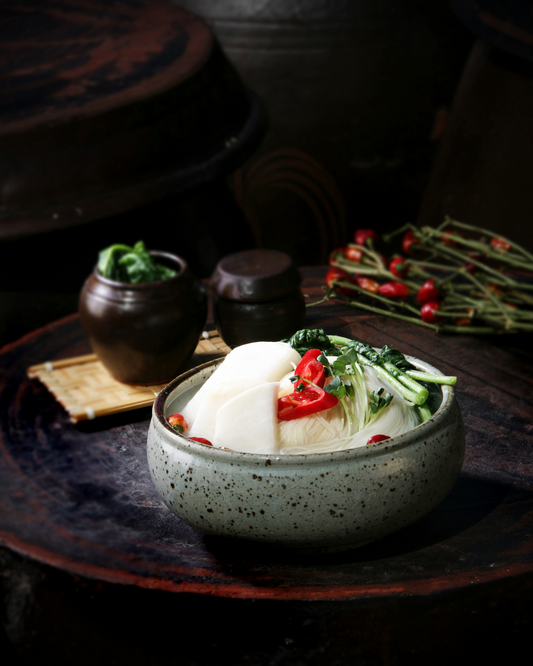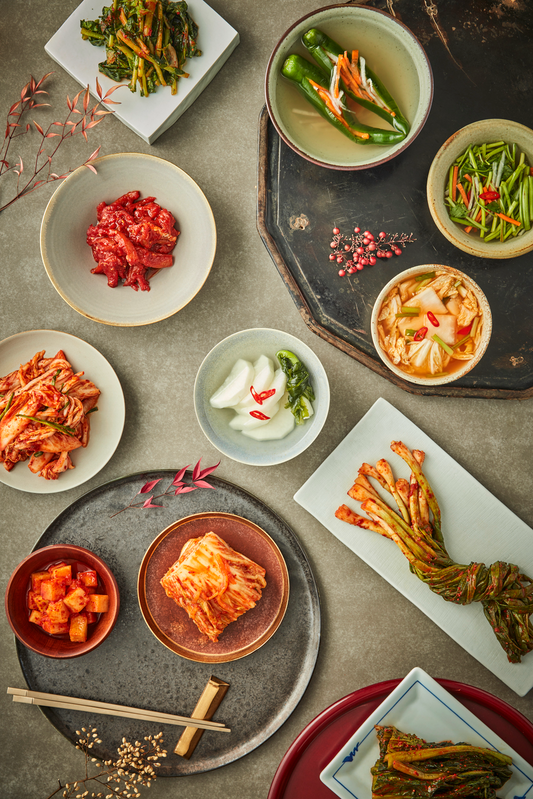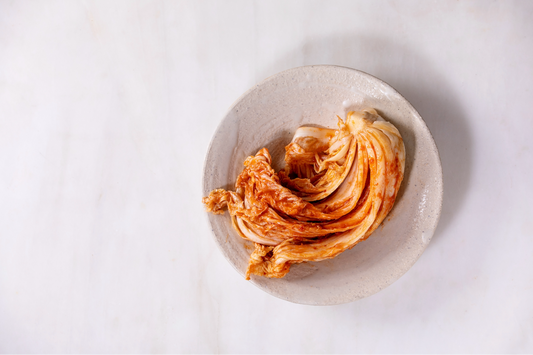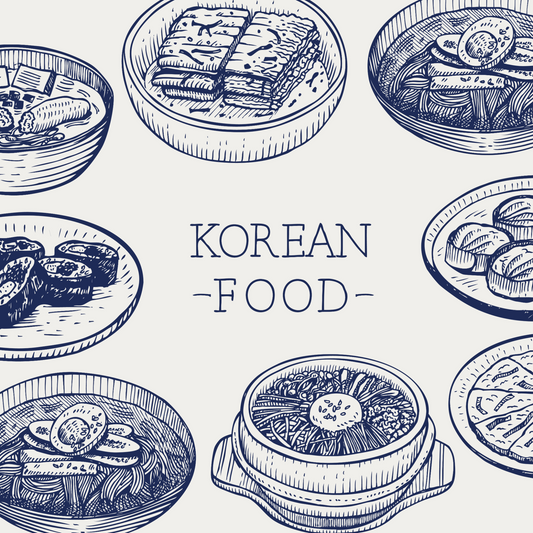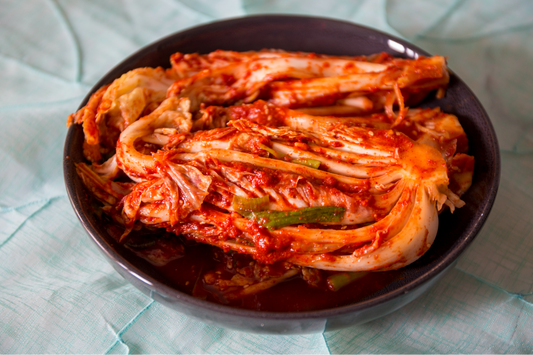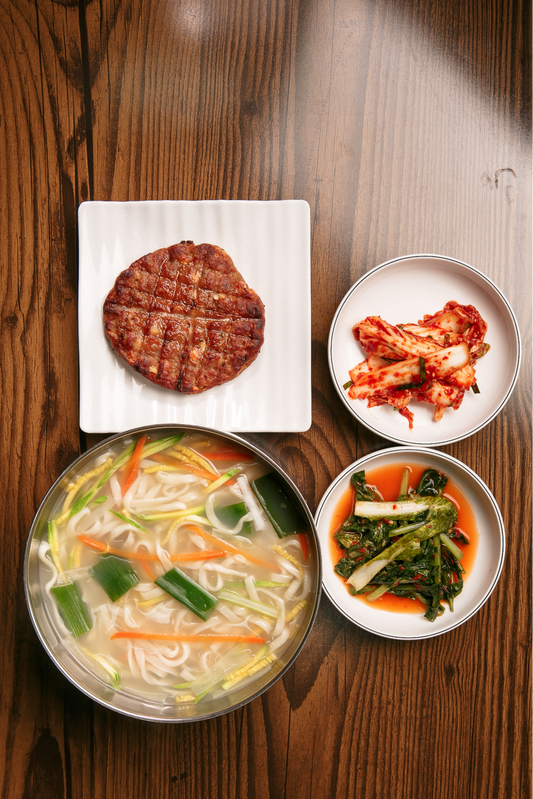Kimchi plays a big role in Korean cuisine. It is not only a tasty side dish but also a key to good health. With over 200 kinds, each serving is full of nutrients yet low on calories. Plus, it adds a burst of flavor to any meal.
Just one cup of kimchi has only 23 calories. But it's full of important vitamins and minerals. It has Vitamin C to boost your immune system and Vitamin A to fight inflammation. Thanks to being fermented, kimchi lasts longer and is full of probiotics. These are great for your gut health and more.

Key Takeaways
- Kimchi is a low-calorie, nutrient-dense food ideal for those looking to enrich their diet without an abundance of calories.
- The fermentation process not only creates distinctive flavors but also boosts the probiotic content in kimchi, supporting a healthy gut microbiome.
- Rick in Vitamin C and anti-inflammatory properties, kimchi supports the immune system and may reduce inflammation.
- Studies suggest that kimchi can aid in weight management and improve metabolic health indicators such as BMI and waist-to-hip ratio.
- Consuming kimchi has been linked to positive effects on heart health by aiding blood vessel function and potentially lowering blood pressure.
- As a low-carb option, kimchi is suitable for ketogenic diets and also contributes to one's daily dietary fiber intake.
- While kimchi is rich in health benefits, it's important to be mindful of its salt content and choose varieties that fit within daily sodium intake recommendations.

Improved Digestion
Kimchi, a traditional Korean food, shows how fermentation and probiotics benefit gut health. It uses Lactobacillus bacterium in lacto-fermentation. This process boosts digestive health greatly.
Role of Fermentation: The impact of the fermentation process on digestion.
Fermentation makes kimchi's carbs and sugars simpler to digest. It also helps good bacteria grow. The Lactobacillus bacterium is key here. It helps the gut stay healthy.
Lactic acid from fermentation keeps the gut acidic. This stops bad pathogens from growing. It helps keep the digestive system working well.
Probiotics: The effect of beneficial microorganisms in kimchi on digestive health.
Kimchi's probiotics help balance gut bacteria. This leads to better digestion. These tiny helpers make nutrients easier to absorb. So, your body gets more from what you eat.
Eating kimchi often can reduce bloating and irregular bowel movements. It does this by improving the gut flora. This is good for anyone with stomach issues.
Gut Microbiome Balance: The positive impact of kimchi on gut microbial communities.
A healthy gut microbiome is crucial. It affects our immune system and even our mood. The probiotics in kimchi play a big role in this balance.
They help build a community of microbes that boost gut and immune health. Adding kimchi to your meals regularly can lead to fewer digestive problems. Plus, it can improve your overall health.

Enhanced Immunity
Kimchi has great health benefits, especially for the immune system. It's full of vitamin C and antioxidants. These help strengthen our bodies against diseases. Kimchi, a key part of Korean food, boosts our immunity in interesting ways. This shows why it's important to eat.
Vitamin C and Kimchi: The effect of vitamin C in kimchi on immunity.
Kimchi isn't just tasty; it's also rich in vitamin C. This vitamin is known to help our immune system. Fermentation increases its vitamin C level. This makes our immune system stronger, helping us fight off infections. So, eating kimchi regularly is good for our immune health, as part of a healthy diet.
Antioxidant Properties: How the antioxidants in kimchi contribute to enhanced immunity.
Kimchi's antioxidant power comes from ingredients like garlic, ginger, and peppers. These antioxidants reduce stress in the body that can harm our immune system. They keep our cells working right, including those that defend us against disease.
Reduction of Inflammation: How the fermentation of kimchi helps reduce inflammation.
The fermentation process in kimchi boosts vitamin C and antioxidants. It also adds good probiotics that lower inflammation. These probiotics adjust our immune system to avoid too much inflammation. So, adding kimchi to meals is a smart way to keep our immune system balanced and responsive.
Eating kimchi often is a smart move for a stronger immune system. It gives us vitamin C, antioxidants, and reduces inflammation thanks to fermentation. Kimchi is not only important in Korean culture. It's also key for a healthy eating plan.
Weight Management
Kimchi is a standout low-calorie food that is great for managing weight. It's not just tasty, but also packed with health benefits. This is thanks to its high dietary fiber and low calories.

Low-Calorie Characteristics
Kimchi's low calories make it perfect for anyone looking to manage weight. It keeps you feeling full without consuming too many calories. Vegetables like cabbage and radish in kimchi add to its benefits while keeping calories low. Studies have shown that eating kimchi regularly can decrease body fat and help avoid overeating.
Role of Dietary Fiber
Dietary fiber in kimchi aids in feeling full, which helps with weight control. Foods high in fiber, like kimchi, prevent overeating by satisfying hunger longer.
Research supports that fiber plays a key role in controlling weight. Eating kimchi can help maintain a sense of fullness, leading to less calorie intake.
Kimchi is not just healthy, it also promotes gut health, key for weight management. It can be a side dish or a main ingredient in meals. Adding kimchi to your diet supports weight loss and helps keep it off.
Blood Pressure Regulation
Hypertension is a major global health issue today. Our diets play an important role in managing blood pressure. With so many people suffering from high blood pressure, finding the right diet is key. The Journal of Hypertension's reports from 2004 and 2009 spotlight this urgent need. Eating low-sodium kimchi is one great way to control blood pressure.

Low-Sodium Kimchi: The impact of sodium content in kimchi on blood pressure
Research shows that less sodium in your diet can lower blood pressure. This was clearly seen in a 1996 study in JAMA. Traditional kimchi, however, is often loaded with sodium, which can raise blood pressure. But, there's good news.
Healthier, low-sodium kimchi has been created. It's great for controlling blood pressure without the high sodium drawback. A 2007 study in the Korean Journal of Community Nutrition points out Koreans' high sodium intake. This makes a strong case for choosing low-sodium food options.
Role of Minerals: How potassium in kimchi ingredients helps regulate blood pressure
Potassium plays a big part in keeping blood pressure in check. It works against sodium's negative effects. Kimchi has ingredients like cabbage which are packed with potassium. Eating foods rich in potassium, like low-sodium kimchi, can help manage blood pressure.
Having a good balance of potassium and sodium is crucial for heart health. This was discussed in Nature Clinical Practice Cardiovascular Medicine in 2004. Studies show eating more potassium can lower the risk of high blood pressure in different groups of people.
In conclusion, adding low-sodium kimchi to your diet is a smart move for blood pressure health. It’s low in sodium and high in potassium. This makes low-sodium kimchi a top choice for a heart-healthy diet and keeping blood pressure normal.

Skin Health
The story of skin health and kimchi goes beyond traditions. It's based on its nutritional richness. Around the world, Korean skincare stands out. This is often linked to eating kimchi daily. This dish nourishes the skin, making it look and feel better.
Vitamin A and Skin
Vitamin A in kimchi plays a key role for the skin. It helps skin cells grow again and keeps skin strong. It fights irritation and wards off infection. This leads to smoother and more even skin.
Eating kimchi raises your body's vitamin A. This can make your skin look and feel lively and smooth.
Antioxidant Effects
Kimchi's antioxidant effects help keep skin young. Making kimchi makes its nutrients, like vitamins C and A, easier for our bodies to use. These are antioxidants that protect skin from harm by free radicals and environmental threats. They help fight aging in skin.
This protection helps keep skin strong. It stays moist, stretchy, and young.
Eating kimchi, sauerkraut, and kombucha every day is good for you. They bring helpful probiotics and antioxidants into your body. This isn't just great for your stomach but also for your skin. It fights inflammation and makes your skin look clear and healthy. Adding these foods to your diet can greatly improve how your skin and overall health look, showing how important diet is for skin health.

Anti-Cancer Effects
People are talking more about how traditional fermented foods, like fermented kimchi, may fight cancer. Studies suggest the way kimchi is made and its special ingredients could help prevent cancer. This has made many take notice.
Anti-Cancer Nutrients and Components in Kimchi
Research shows certain parts of kimchi can help stop the spread of cancers. A key study found fermented kimchi was effective against leukemia and stomach cancer cells. This effectiveness comes from compounds like glucosinolates, which increase during fermentation. Plus, the probiotics in kimchi, like Lactobacillus, boost health and fight cancer too.
Eating kimchi regularly might be a smart choice for those wanting its anti-cancer effects. Research into anti-cancer findings is ongoing. It reveals that traditional foods like kimchi not only taste good but also offer significant health benefits.
A 2014 study by Park KB et al. showed kimchi fermented in a special fridge had stronger anti-cancer effects on human cancer cells. This highlights how vital the fermentation process is in boosting traditional food's health benefits.
As evidence mounts, both consumers and health experts should focus more on fermented kimchi in cancer prevention. The study of fermented foods like kimchi is becoming vital in health care worldwide.

Anti-Inflammatory Effects
Researchers are paying attention to kimchi, a fermented Korean food, for its health benefits. A review in the Journal of Food Science shows its anti-inflammatory and immune-boosting qualities. The probiotics in kimchi help reduce inflammation. This promotes a healthy gut, which is key to good health.
Anti-Inflammatory Nutrients and Components in Kimchi
Kimchi is full of ingredients that fight inflammation effectively. A 2021 study in Nutrients found that fermentation not only improves flavor but also health benefits. Research in PLoS ONE in 2019 showed vegetables in kimchi increase their anti-inflammatory actions after fermentation. Eating kimchi can help manage inflammation and health problems linked to it.
Kimchi has big health benefits, like reducing body inflammation. Studies show that eating it regularly can help your heart and metabolism. A study highlighted a diet with fermented foods, including kimchi, boosts gut microbial diversity and lowers immune cell activation. Research institutions like the Center for Human Microbiome Research support these findings. They show how diet affects inflammation and health.
FAQ
What are the health benefits of kimchi?
Kimchi is full of nutrients yet low in calories. It may boost the immune system. It also reduces inflammation and adds good bacteria for your gut.
How does the fermentation process of kimchi improve digestion?
Fermentation boosts probiotic levels, especially Lactobacillus bacteria. This improves digestion. It also supports gut health.
Can kimchi have a positive effect on the gut microbiome?
Yes, kimchi's probiotics help keep the gut healthy. This can make digestion better. It also soothes some gut problems.
How does kimchi enhance immune function?
Kimchi is rich in vitamin C and antioxidants. These strengthen the immune system. They also lower markers that cause inflammation, boosting infection defense.
How does kimchi help reduce inflammation?
Kimchi's probiotics and compounds from veggies may lower inflammation markers. This helps your body fight inflammation.
Can kimchi aid in weight management?
Yes, kimchi is low in calories but high in fiber. It makes you feel full, controls hunger, and can help in losing weight.
Is kimchi good for blood pressure regulation?
Special low-sodium kimchi, packed with potassium, can help regulate blood pressure. It is good for the heart too.
How does kimchi contribute to skin health?
Kimchi has vitamins like vitamin A and antioxidants. These can keep skin from aging too fast. They also lessen skin inflammation.
Does kimchi have anti-cancer properties?
Nutrients and bioactive compounds in kimchi may fight cancer. They can start a process called apoptosis. This might prevent some cancers.
What are the anti-inflammatory effects of kimchi?
The probiotics and veggies in kimchi fight inflammation. This can reduce body-wide inflammation. It's good for your health overall.

